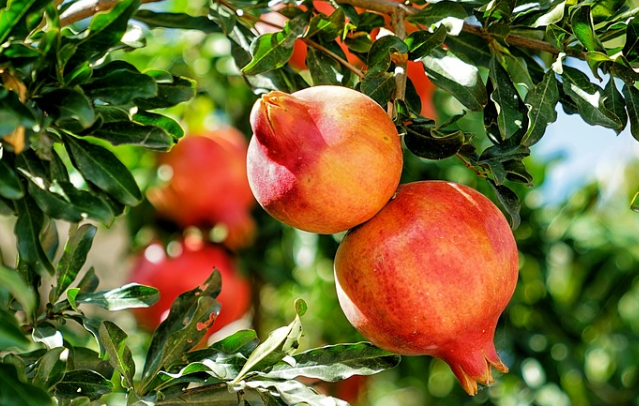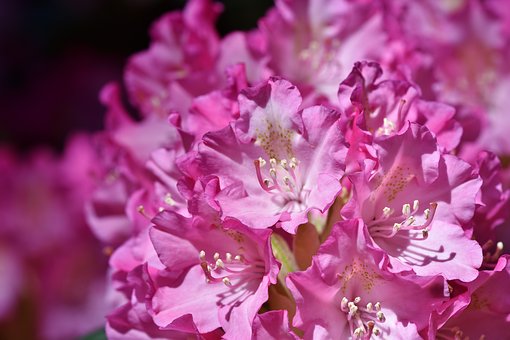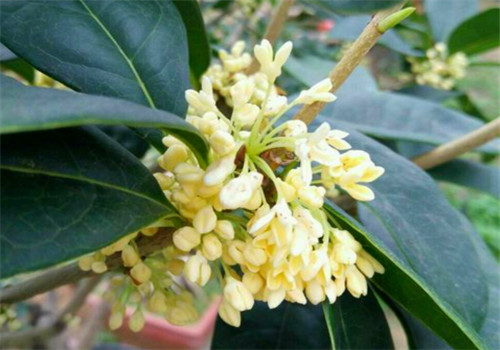What does the pomegranate tree called "longevity tree" look like? What's the best way to plant? How many years does it take to blossom and bear fruit?
Pomegranate is a kind of tree species with long life and strong adaptability. in order to obtain high quality and high yield products for a long time and obtain higher economic benefits year after year, we must select excellent varieties and carry out reasonable cultivation and management according to the requirements of environmental conditions of pomegranate tree species. So what does the pomegranate tree look like? How best to plant it? How many years does it take to blossom and bear fruit?
What does the pomegranate tree look like?
There are many branches in the crown, and the twigs are angled and square. Twigs are flexible and not easy to break. One branch staggered opposite on a growing branchlet, with small spines. The length of thorn is related to variety and growth. A prosperous tree has many thorns, but an old tree has few thorns. The color of buds varies with the seasons, including purple, green and orange.
Leaves opposite or clustered, oblong to oblong, or elliptic-lanceolate, 2-8cm long and 1-2cm wide, apex pointed, glossy surface, abaxial midrib raised; short petiole.
Flowers bisexual, according to whether the ovary is developed or not, there are bell-shaped flowers and tubular flowers, the former ovary developed is good at fertilization results, the latter often withered unfruitful; generally 1 to several flowers born in the axils of the leaves below the top of the new shoots of the current year; sepals hard, fleshy, tubular, 5-7-lobed, connected with ovary, persistent; petals Obovate, as many as sepals and alternate, imbricate arrangement. Flowers can be divided into single and double. Double variety pistil and stamen multi-petal and sterile, petals as many as dozens of petals; flowers are more red, but also white and yellow, pink, agate and other colors. Stamens numerous, filaments glabrous. Pistil with 1 style, longer than stamens, carpels 4-8, ovary inferior. The fruit pomegranate florescence is from May to June, the pomegranate flower is like fire, and the fruit period is from September to October. Flowering period of pomegranate is from May to October.

Second, how best to plant pomegranate trees?
1. Time: the best planting time for pomegranate trees is from late March to early May in spring, when pomegranate trees are easier to survive.
2. Soil: pomegranate is not strict on soil, so the soil layer is deep, and the underground water level is lower than 1m ph value and can be planted on the soil layer of 4.5-8.2. If it is a potted plant, the soil should be loose, fertile and well drained. Choose rotten leaf soil, mixed soil and river sand, and add appropriate amount of mature organic fertilizer.
3. Temperature: pomegranate trees like warmth, the most suitable growth temperature is 15-20 ℃, and the lowest temperature in winter should be higher than-17 ℃, otherwise they will suffer frost damage. If you are in the cold north, you should put the cellar in winter to protect against the cold.
4. Light: pomegranate trees like light. In particular, the growing period requires all-day sunshine, and the more sunlight, the more flowers, the more colorful. But if the light is not enough, it will only grow leaves and not blossom, affecting the ornamental effect.
5. Planting: when all kinds of conditions are suitable, pomegranate seedlings can be planted. When planting, you should choose large seedlings, bury the soil after planting, slowly release seedlings after germination, and irrigate root water.
Then pay attention to pruning and water and fertilizer management.
Third, how many years before pomegranate trees blossom and bear fruit?
The fruiting age of pomegranate trees varies with different breeding methods and varieties.
1. It takes more than 10 years for seedlings sown and propagated with pomegranate seeds to blossom and bear fruit.
2. Seedlings propagated by cuttings or ramets will bear fruit after planting for 3-4 years.
3. Double petal red pomegranate or agate pomegranate, which is mainly for viewing flowers, can blossom in the same year when sowing.
Pomegranate blossoms 3 times a year, so it has 3 times of fruit, generally to head flower or two flowers and fruits develop well. It should be harvested in time according to variety characteristics, fruit maturity and climatic conditions. The signs of fruit maturity are as follows: the pericarp changes from green to yellow, the colored varieties are fully colored, and the fruit surface appears glossy; the edges of the fruit appear; the red or silver-white needles in the pulp cells appear fully; the grain is full and the soluble solids content of the fruit juice reaches the inherent concentration of the variety. Harvest of ripe fruit before rain, but forbidden in overcast and rainy weather.
It should be noted that the size of the fruit after maturity varies according to the variety and age of the tree. The mature fruit of the large fruit variety is only slightly smaller for the first time, and the mature fruit of the third year reaches the maximum target, while the variety of small fruit is also a small fruit for many years from young fruit growth to maturity. Both large fruit varieties and small fruit varieties can be eaten as long as they are ripe.
Of course, if the fruit of your pomegranate tree is still small from the second year to maturity, you may be planting ornamental pomegranates.
Time: 2019-04-06 Click:
- Prev

How much is the market price of rhododendron bonsai, the king of woody flowers? When will it blossom? How to breed
Azaleas, also known as Yingshanhong, pomegranate and Zhaoshanhong, are common flowers in mountainous or pine forests. They are deeply loved by flower friends because of their various colors and beautiful flowers. At present, many people like to keep them at home or in the office to improve the indoor environment. How much is the market price of rhododendron bonsai?
- Next

What kind of flowers are suitable for growing in rural Hunan? How do you take care of it?
Flowers have always been loved by people, whether at home or in the office, a few pots of flowers can not only purify the air and beautify the environment, but also make people physically and mentally happy, so what kind of flowers are suitable for growing in rural Hunan? How do you take care of it? Magnolia lanceolata is a perennial evergreen herb of Liliaceae.
Related
- Fuxing push coffee new agricultural production and marketing class: lack of small-scale processing plants
- Jujube rice field leisure farm deep ploughing Yilan for five years to create a space for organic food and play
- Nongyu Farm-A trial of organic papaya for brave women with advanced technology
- Four points for attention in the prevention and control of diseases and insect pests of edible fungi
- How to add nutrient solution to Edible Fungi
- Is there any good way to control edible fungus mites?
- Open Inoculation Technology of Edible Fungi
- Is there any clever way to use fertilizer for edible fungus in winter?
- What agents are used to kill the pathogens of edible fungi in the mushroom shed?
- Rapid drying of Edible Fungi

